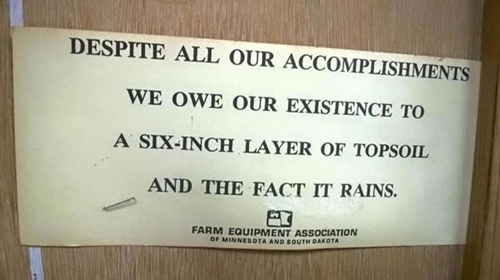This blog post originally appeared on Peter's 'Fresh from the Field' blog on 19th January 2016.
I read with interest the headline “monster worms” have been found on the island of Rum off the west coast of Scotland – Malt whisky induced Anacondas I thought to myself!
They have indeed found some fairly huge earthworms having said that. These brutes measure up to forty centimetres (1.3 ft) long and weigh in at twelve and a half grams, rather than the more normal four or five grams.

Dr. Kevin Butt, who has been studying these worms, says that he believes they have blossomed due to rich soil and a lack of predators. Rum worms are bigger than average due to their remote, undisturbed location, with good quality soil and for the fact that the island also lacks predators such as badgers, moles, hedgehogs and foxes which would usually gobble the worms before they had chance to grow into monsters.
Unlike most animals, which stop growing once they reach an adult size, earthworms keep on growing if left to their own devices and can surprisingly live for at least 20 years or so if nothing eats them.
The spotlight has been turned onto earthworms lately, not just because of these giant Scottish ones, but also because of the important role that trillions of ordinary, humble worms play every day.
I have said this before on this Blog – but it is worth repeating – “Darwin always stated that the earthworm was the most important species on the planet”.
It seems to have taken most of us an age to get around to realising this, and to learn more about this vital role that worms carry out.
One person who has known this for some time is our own GWCT soil specialist, Dr. Alistair Leake, who often quotes that research had shown an earthworm presence in soils of 400 per square metre could increase crop yields by up to 25%. They are also turning over the soil for me, without a penny being spent on diesel he often states, while grinning broadly!
Research has shown that earthworms boost plant growth by helping release nitrogen from the soil during their burrowing and feeding activities, which is otherwise locked away in soil organic matter or plant residue".
They also improve soil structure which enables better plant rooting, improve infiltration rates and moisture and their activities also stimulate microbe activity. They also carry out bio-control which reduces pests and diseases in soil. If you only have a few worms in the soil there will be an increase in surface run-off and potential erosion issues.
A simple test you can do to find out how your earthworm numbers are faring, is to take a spade full of soil and see how many worms you can count. If at least 16 earthworms are totted up, then there will be an increased benefit, not only potentially in crop yields, but also through reduced water run-off – a very topical issue at present!
It is worth noting that worms can reach staggering numbers if the soil is in top class nick. If every man, woman and child in this country was a worm, we could fit them all into a good quality 70 acre grass field!
As Cilla would have said “That’s alotta, lotta of worms!”
FREE eBook - Download Peter's 2015 'Species of the Month' articles
*You may change your mind any time. For more information, see our Privacy Policy.